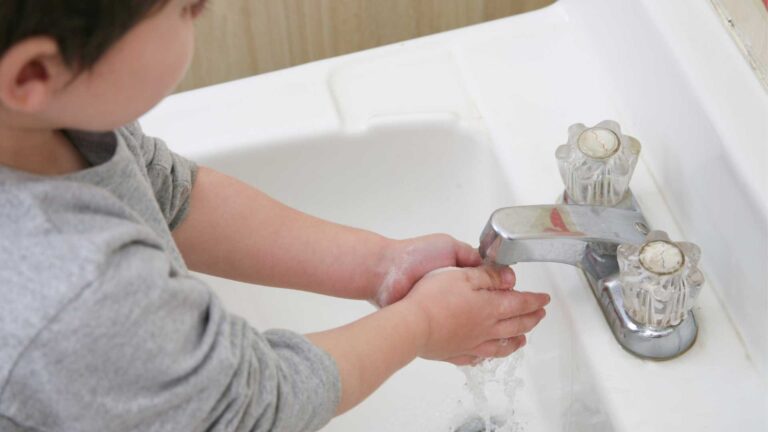Handwashing and autism: For children with autism spectrum disorder (ASD), acquiring daily living skills can present unique challenges. With the world’s growing population and the globalized nature of disease spreading, one important skill becoming more so is proper handwashing. Regular handwashing is crucial for maintaining good hygiene and preventing the spread of germs; hence it’s one of the first things toddlers learn. “Did you wash your hands?” is one of infancy’s mantras.
Yet some kids on the spectrum find these behaviors challenging to comprehend. ASD can cause problems with executive functioning, which are skills that involve planning, executing self-control, and establishing routines that don’t require monitoring. This deficiency and their challenges following societal expectations can cause problems maintaining hygiene.
At ABA Centers of Florida, we understand the importance of keeping your kid healthy. Individuals with ASD are more likely to have various medical conditions, such as sleep difficulties, gastrointestinal disorders, and allergies, that make cleanliness even more critical for well-being.
In this article, we will explore practical strategies and Applied Behavior Analysis (ABA) therapy techniques to teach children with ASD how to engage in proper handwashing to avoid getting sick.
1. Understanding Handwashing and Autism
Many of the hallmark difficulties of autism cause problems learning basic tasks during infancy. These factors, described below, can contribute to challenges in learning and practicing proper handwashing techniques.
- Difficulty with Transitions: Children on the autism spectrum often changes in routines. Handwashing involves interrupting an ongoing activity or deliberately pausing on your way to what you want to do. It can be challenging for children who thrive on predictability and struggle with shifting their attention.
- Social Communication and Understanding: Kids learn handwashing through verbal instructions and social modeling. However, children on the autism spectrum may experience challenges with social communication and understanding nonverbal cues commonly used during handwashing demonstrations. They may struggle to grasp the intended meaning or may find it challenging to imitate the actions of others.
- Executive Functioning Challenges: Children with autism may have difficulties understanding and following the sequential steps involved in handwashing. Remembering the specific order of actions, such as turning on the tap, applying soap, rubbing hands together, rinsing, and drying, can be a complex process for them.
- Sensory Sensitivities: Water, soap, and the sensations associated with handwashing (e.g., wetness, lathering, rinsing) can be overwhelming or uncomfortable for them. The texture, temperature, and sound of running water may trigger anxiety or sensory overload, making it difficult to focus on handwashing.
- Generalization and Transfer of Skills: Children with autism often face difficulties generalizing skills learned in one context to other settings. Even if they know handwashing is appropriate in a specific environment, such as their home or school, they may struggle to apply those skills in different situations, such as public restrooms or other people’s homes.
2. Teaching Strategies
Parents can use some commonsense techniques to introduce handwashing to kids with ASD.
- Visual schedules: Create a step-by-step guide depicting handwashing, including pictures or simple drawings for each step. Countdown timers can help children understand the appropriate duration for handwashing.
- Social stories: Develop social stories that describe the importance of handwashing, when it is necessary, and how to perform it correctly. Use precise language and age-appropriate illustrations to enhance comprehension.
- Structured Routine: Ensure that handwashing is incorporated into the child’s daily routine consistently, such as before meals, after using the restroom, and upon returning home.
- Task Analysis: Break down the handwashing process into small, manageable steps to make it easier for children with ASD to learn. Provide clear and concise instructions for each step, ensuring that they understand and can follow along. Gradually fade prompts and cues as the child becomes more proficient.
3. ABA Therapy Techniques
Applied Behavior Analysis (ABA) therapy is the best therapy for autism; evidence-based and proven effective by decades of research. ABA therapists use various techniques to teach kids crucial skills for their growth and independence. Parents can watch ABA therapists and learn these skills during sessions, reinforcing them daily with their kids.
- Modeling and Imitation: Children with ASD can learn by observing and imitating others. ABA therapists can demonstrate proper handwashing techniques and encourage the child to emulate their actions. Providing visual and verbal prompts during the imitation process can facilitate learning.Encourage social integration during handwashing routines by engaging in handwashing activities as a group. This modeling can help children with ASD observe and imitate their peers, fostering social interaction and reinforcing the skill.
- Reinforcement: Positive reinforcement plays a crucial role in ABA therapy. Identify motivating reinforcers for the child, such as praise, tokens, or preferred items, and use them to reinforce the successful completion of each handwashing step. Ensure the reinforcement is immediate, consistent, and tailored to the child’s preferences.Continue this reinforcement when not at home to ensure skill generalization. If you are at the mall or a restaurant, take your kid to the restroom afterward and continue encouraging their good behavior.
- Play therapy: Kids love playing, and kids with ASD are no exception. Through play, therapists and parents can teach many valuable skills without the kids realizing they are learning lessons. Turn handwashing into a game, and introduce a rhyme or a scenario where toys wash their hands. Turning learning into fun can go a long way.
Teaching proper handwashing skills to children with autism spectrum disorder requires patience, consistency, and individualized strategies. Parents, caregivers, and ABA therapists can effectively lead this essential hygiene skill by making it a fun part of their routine while incorporating ABA therapy techniques. With these strategies, children with ASD can develop the necessary skills for proper handwashing, securing their children’s hurt, and avoiding unnecessary sick days.
ABA Centers of Florida Can Help!
If you need assistance teaching your kids the skills necessary for daily living, social interaction, and academic success, ABA Centers of Florida is here to help. We offer the best ABA therapy, and our team of experts crafts individualized plans to make sure your child grows in incredible ways toward happiness, success, and independence.
Call (772) 773-1975 or message our website for a FREE CONSULTATION.








